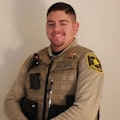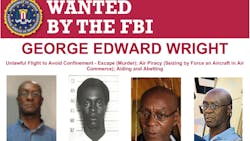How to Catch A Criminal: Catch, Escape, Repeat (Part 2)
Every officer with a decent amount of time on the job knows the unexpected turns an investigation can take. Seeing a major case through to completion often involves giving up on a theory and taking your investigation in a different direction as new information becomes available. In How to Catch A Criminal, we look at the many ways not-so-perfect crimes are solved. This month, the conclusion to the story of escaped murderer, George Wright.
George Wright, dressed as a reverend and armed with a handgun, took a flight attendant hostage and demanded to speak to the pilot. The other members of his makeshift band of hijackers, in their respective disguises, followed suit. They ordered the plane be landed in Miami as scheduled, but if the 86 passengers on board were to be safe, their demands needed to met. The hijackers wanted $1 million, delivered by a man in a skintight bathing suit, to ensure nobody armed could approach the plane. The pilot radioed the situation to the control tower and the FBI was quickly on the case. Once they landed, an FBI agent, in tight swimwear, approached the plane with the cash in a suitcase. A crew member was instructed to hoist the cash into the plane. True to his word, Wright released the passengers, and informed the pilot and crew they would be staying on board and flying him and his cohorts to Algeria.
The pilot informed Wright they did not have enough fuel for an international flight, and he was not trained or experienced in anything but domestic flights. In an attempt to avoid any loss of life, the airline and the FBI arranged for the plane to land in Boston, refuel, and have an international navigator join the crew. They then set out for Algeria, and with the help of Spanish air traffic control, they landed in Algiers. Thanks to a a sympathetic socialist government, Wright and his crew were able to gain political asylum with the help of Black Panther's leader and American expatriate Eldridge Clever, who had been granted asylum after fleeing assault charges in the US. The $1 million dollars however, was seized by the Algerian government, and it, the plane, and the flight crew were sent back to the US. Wright and the others lived with Clever for a time, but traveled to Paris after becoming disheartened with Clever's cause. In 1976, while living in Paris, George Brown, Joyce Brown, the McNairs, and the children, were all apprehended when it was discovered they were carrying false passports. Their identities were uncovered, and they were tried in a French court for the plane hijacking. This was due to their attorneys arguing they would not receive a fair trial in the US. Each adult was sentenced to three years in prison. Once again however, George Wright evaded capture.
Just prior to the arrest of the others, Wright broke away from the rest of the group and decided he was better off making a life for himself one his own. While the rest were in prison, Wright traveled to Portugal in order to avoid being found out like his fellow, former Americans. Wright began using the name Jorge as a cover, and eventually met a woman named Rosario, who he took quite an interest in. Unfortunately for their budding romance, Wright didn't feel safe staying in Portugal, and wanted the same asylum he received in Algeria. Wright moved to the nation of Guinea-Bissau in Africa, as their government was known to offer refuge to expatriates. There, the government granted him asylum and citizenship. The Vice President of Guinea-Bissau believed Wright was a revolutionary thanks to his actions in the US, and offered to help establish Wright's false identity of Jose Luis Jorge dos Santos. Now with proper paperwork in hand, Wright didn't feel the need to run any longer. Rosario moved to Guinea-Bissau and eventually the couple married and had two children. Wright held various jobs there before moving his family back to Portugal, where he became citizen. Wright lived there in peace with his new family from 1993 until September 2011.
The FBI reopened Wright's case in a renewed push to capture wanted fugitives. A look at Wright's sister's phone records showed she made occasional calls to a man in Portugal. Wright's Portuguese ID card was obtained, and the fingerprints associated with it were matched to his fingerprints on file with the New Jersey Department of corrections. An international arrest warrant was obtained, when he was confronted with his real name, Jose Luis Jorge dos Santos admitted his true identity. The next hurdle was extradition.
The US government intended to have Wright brought back the country he fled in order to serve the remaining 22 years of his prison sentence for the robbery and murder of Walter Patterson, as well as stand trial for the plane hijacking. These plans hit a snag however, when Wright's Portuguese attorney argued that the statute of limitations for his crimes had run out, because despite the crimes occurring in the US, Portugal has a 30 year stature of limitations for murder. A panel of judges were tasked with determining if George Wright would be returned to the US, where, given his age, he would almost certainly die in prison. After weeks of deliberation, the judges decided Wright could no longer pose a threat to anyone, and he had been a Portuguese citizen for almost 20 years. Given these facts, he would not be extradited back to the US. This decision was later upheld despite appeals from the US government. After robbery, murder, airplane hijacking, and plenty of other felonies stemming from the hijacking, and 41 years on the run, George Wright was free to live his life, without punishment. That is, as long as he never leaves Portugal.
About the Author
Brendan Rodela is a Deputy for the Lincoln County (NM) Sheriff's Office. He holds a degree in Criminal Justice and is a certified instructor with specialized training in Domestic Violence and Interactions with Persons with Mental Impairments.
About the Author

Officer Brendan Rodela, Contributing Editor
Brendan Rodela is a Sergeant for the Lincoln County (NM) Sheriff's Office. He holds a degree in Criminal Justice and is a certified instructor with specialized training in Domestic Violence and Interactions with Persons with Mental Impairments.
